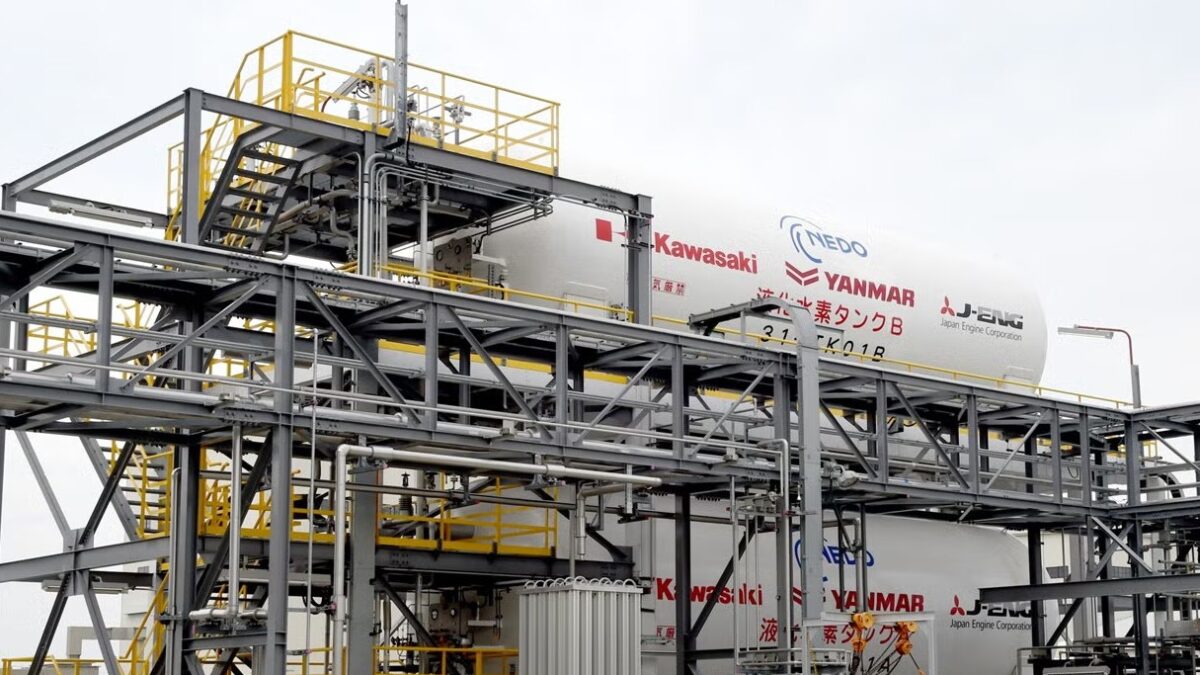Japan Achieves World’s 1st Land-Based Operation of Marine Hydrogen Engine
Japan’s hydrogen engine breakthrough marks a major step toward zero-emission marine fuel and carbon-neutral shipping by 2050.
In a breakthrough for maritime decarbonization, Kawasaki Heavy Industries, Yanmar Power Solutions and Japan Engine Corp. have completed the world’s first land-based operation of a marine hydrogen engine.
The demonstration, held at JEC’s headquarters, showcased a newly developed liquefied hydrogen fuel supply system, marking a significant step toward zero-emission marine fuel technology.
The project is part of Japan’s Green Innovation Fund initiative, administered by the New Energy and Industrial Technology Development Organization. It supports next-generation ship development to achieve carbon neutrality by 2050.
Government-Backed Push for Decarbonization
Japan launched its Green Innovation Fund in 2020, following its 2050 net-zero target. Managed by NEDO and backed by the Ministry of Economy, Trade and Industry, the ¥2 trillion ($13.3 billion) fund supports technologies that accelerate the country’s energy transition.
The program promotes innovation across industries and funds pilot projects through to social implementation. Since its inception, the fund has received additional allocations of ¥300 billion in fiscal 2022 and ¥456.4 billion in fiscal 2023, reflecting the government’s long-term commitment to climate action.
Hydrogen Engine Demonstration Results
Under NEDO’s “Development of Marine Hydrogen Engine and MHFS” project, Kawasaki Heavy Industries built the liquefied hydrogen fuel supply system that stores and gasifies hydrogen. It supplies fuel at both high and low pressures to various marine engines developed by the consortium partners.
The demonstration successfully achieved stable hydrogen combustion in medium-speed four-stroke engines designed by Kawasaki and Yanmar. Both companies confirmed steady performance at rated output, highlighting the potential of hydrogen as a clean alternative marine fuel.
Meanwhile, Japan Engine is developing a low-speed two-stroke hydrogen engine, scheduled to begin operation in spring 2026. Once completed, it will mark another significant advance toward commercial deployment.
Dual-Fuel Technology for Reliability
A key feature of the consortium’s innovation is the dual-fuel capability of the engines, allowing operators to switch between hydrogen and diesel depending on availability and operational needs. This flexibility ensures energy security and system redundancy, addressing one of the biggest hurdles in adopting new marine fuel technologies.
Each company contributed a distinct model tailored for different vessel types. Kawasaki developed a medium-speed four-stroke engine, the 8L30KG-HDF, with a rated output of 2,600 kilowatts.
While Yanmar designed another medium-speed four-stroke engine, the 6EY22ALDF-H, capable of delivering 800 kW, JEC engineered the most powerful of the trio, a low-speed two-stroke engine, the 6UEC35LSGH, which can deliver up to 5,610 kW. Together, these engines cover a broad spectrum of shipboard uses from main propulsion and auxiliary power to electric propulsion systems.
Next Steps Toward Commercialization
Following the successful land-based trials, the partners plan to collaborate with shipowners and shipyards on onboard demonstrations. The goal is to integrate hydrogen systems into operational vessels and establish safety and performance benchmarks for global adoption.
Through these efforts, Japan aims to lead the international shift toward hydrogen-powered ships. The project aligns with the nation’s broader strategy to reduce greenhouse gas emissions and accelerate the global transition to sustainable marine fuel solutions.
By merging expertise across engineering, fuel systems, and marine technology, Kawasaki, Yanmar and JEC are setting a global precedent. Their collaboration represents a concrete move from research to reality in the hydrogen economy.
Also Read:
Scientists Exhibit Device Producing Green Hydrogen from Air in Arid Regions
Nirmal Menon
Related posts

Subscribe
Error: Contact form not found.


